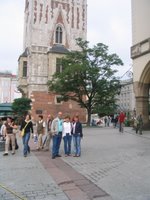
I’m missing Anya. She was my student last year, and a dedicated one. Every Saturday, even when the freezing temperatures kept most other students home, she would come to class. Her English was already quite good, but it improved because she worked hard. She had a goal in mind. I don’t remember when we became friends, but eventually I was introduced to her boyfriend and we started spending time together. She was in the process of applying for a visa to work in the States. She had a good job in Donetsk, but wanted to improve her English and get more work experience in the service industry. She had a Ukrainian friend who was already living there, and she set her up with a job and a place to live. The job was waitressing at Outback Steakhouse. One night Anya came over with several pages of colorful pictures and food descriptions – the restaurant’s menu, which she printed from the Internet. Things like “vine-ripened tomatoes” and “a twist of lemon” and “Bloomin’ Onion” were highlighted in yellow, and we went through the menu, I explaining what each one meant while she took notes. Then it was the visa application and interview questions. She filled out forms and I checked them, and over and over we practiced the questions that might be asked during the visa interview at the American Embassy in Kiev. Meanwhile, we also did other things, besides filling out forms. A highlight was a trip to a nearby village where the parents of her boyfriend’s best friend lived. They treated us like kings and we stuffed ourselves with Ukrainian delicacies to the point of illness. We also tossed a Frisbee on a grassy hill, standing in a circle around a tethered goat, wandered through a nearby marsh and listened to Sergei’s endless music collection. And then she had her interview, got her visa, bought a plane ticket, said goodbye and left. For the first few weeks, we talked on Skype, but now that her documents are in order, she’s working two jobs – the steakhouse, plus a department store job, and has little time to do anything but eat, sleep and work. We’ll be back in the States before she comes back to Ukraine, and if she had the choice, I think she might stay. I’m happy for her, but am sad that she’s gone. Meanwhile, her boyfriend has taken a new job that involves a lot of travel, and is working like mad to fill up his time, so we rarely see him. He studies English in the leftover minutes of every day and hopes to join her as soon as his English is good enough.
Laura




